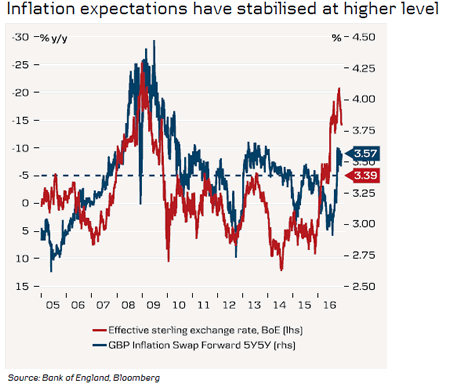6-2 vote count was interpreted dovishly
- As expected, the Bank of England maintained the Bank Rate at 0.25% and kept the targets for the government bond purchases and corporate bond purchases at GBP435bn and GBP10bn, respectively. In line with our call (but against the view of some houses), the vote count for the Bank Rate was 6-2 against 5-3 last time, as Kristin Forbes, a known hawk voting for a hike, has left the committee and it was too early for Andy Haldane to jump camp already despite a more hawkish tone in his latest speech.
- We still view the core of the Monetary Policy Committee (including governor Mark Carney) as being tilted to the dovish side.That said, since the unemployment rate has declined to NAIRU and inflation is above target, it may not take much for BoE to become more hawkish. Higher wage growth (and thus higher underlying inflation) is one trigger.
- We still expect the BoE to remain on hold until the Brexit negotiations are concluded in Spring 2019. The main reasons are that we think the BoE is still too optimistic on both wage growth and GDP growth and political uncertainty remains high due to Brexit.
- As expected, the BoE announced that it is ending the so-called Term Funding Scheme (TFS) in February 2018, as the BoE has been more worried about credit growth recently.
We lift our EUR/GBP targets to 0.91 in 1-3M
- EUR/GBP rose sharply and broke above 0.90 on the announcement as expected given the dovish twist from the BoE. UK yields traded some 4-5bp higher across the 2-10Y segment of curve, while the very front end of the UK money market curve was little changed. The market now implicitly indicates around 35% probability (8.5bp priced) of a November rate hike compared to 9.5bp priced prior to the BoE announcement.
- Over the coming 1-3 months, we expect EUR/GBP to test higher levels on the back of a strong EUR and BoE repricing. A 5bp decline in 2Y UK yields due to a further postponement of market expectations for the first BoE rate hike, will (everything else being equal) push EUR/GBP 0.1-0.25% higher, according to our models. We lift our 1M and 3M EUR/GBP targets to 0.91 (previously 0.88) expecting the cross trade within a narrow range of 0.90-0.92.
- Over 3-12M, we continue to see some stabilisation in GBP, expecting EUR/GBP to drift back below 0.90 on the back of potential for some clarification regarding Brexit negotiations and valuations.However, as relative growth and relative monetary policy is expected to remain EUR/GBP supportive in the medium term, we see only modest downside potential in the year ahead. We target 0.90 in 6M (previously 0.88) and 0.88 in 12M.
- Given the high political uncertainty due to the British government’s weak parliamentary majority, we expect EUR/GBP to remain volatile and we generally recommend investors and corporates hedging GBP assets/income to maintain a high hedge ratio.
35% probability of a BoE hike this year, according to market pricing
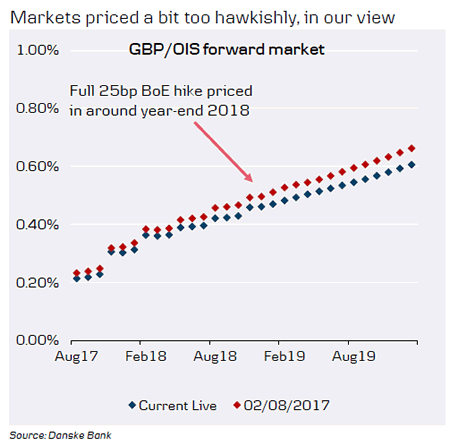
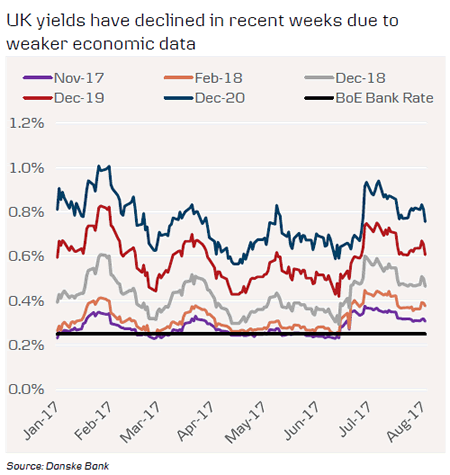
BoE still too optimistic on growth
BoE expects growth to pick-up again next year
- The Bank of England has lowered its GDP forecast both because it overestimated growth in H1 17 and because it has become more pessimistic in the short term. However, the BoE still expects growth to pick up next year, as business investments pick up and consumption recovers due to higher wage growth.
- We still think the Bank of England is too optimistic on growth, as we do not think wage growth will pick up as fast as the BoE projects and think business investment growth will remain subdued.
- We expect GDP growth to continue around 0.3% q/q in coming years, slightly below trend growth of 0.4%.
- As we are more pessimistic on growth, we still expect the BoE to remain on hold until the Brexit negotiations are concluded in Spring 2019.
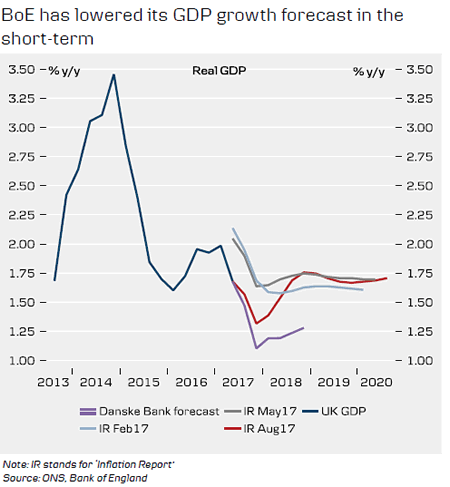
Inflation projection unchanged
- As expected, the CPI inflation forecast was broadly unchanged. CPI inflation is expected to stay above 2% in coming years, as it takes time for the weaker GBP and higher import prices to pass-through to consumer prices and because the Bank of England expects wage growth to pick up.
- We think the BoE is still too optimistic on wage growth and hence underlying inflation, which is one of the reasons why we do not think the BoE will hike soon.
- That said, higher wage growth remains one of the triggers for a more hawkish BoE.
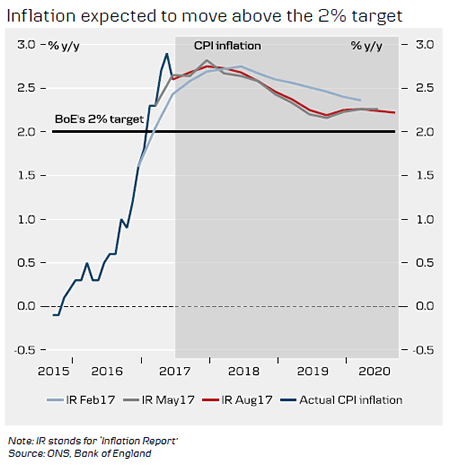
Unemployment rate to stabilise around current NAIRU
- The Bank of England projects that the unemployment rate will stabilise around 4.5% (which is also the BoE’s NAIRU estimate). The combination of higher inflation and lower unemployment was one of the reasons why the BoE turned more hawkish in June/July.
- Still, the tight labour market has not translated into higher wage growth yet and given that NAIRU is unobservable, the BoE may revise down its NAIRU estimate further at some point.
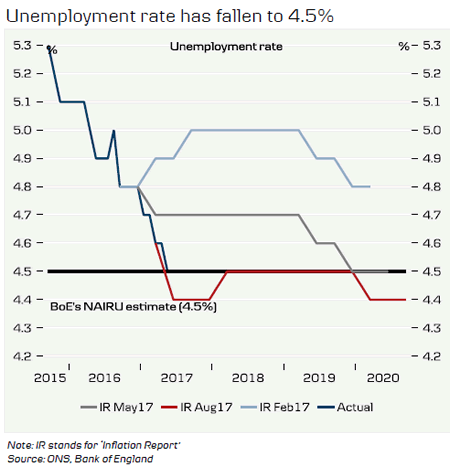
Macro charts: slowest UK growth since the European debt crisis
GDP growth in H1 17 the weakest since the European debt crisis
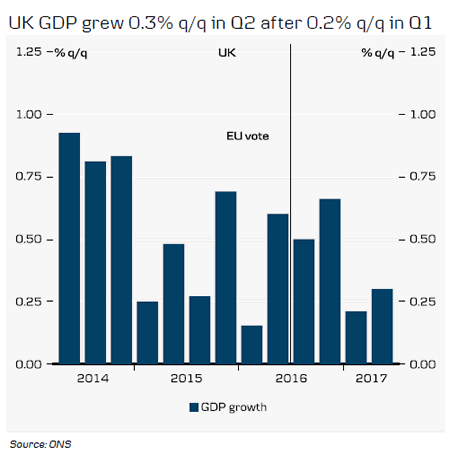
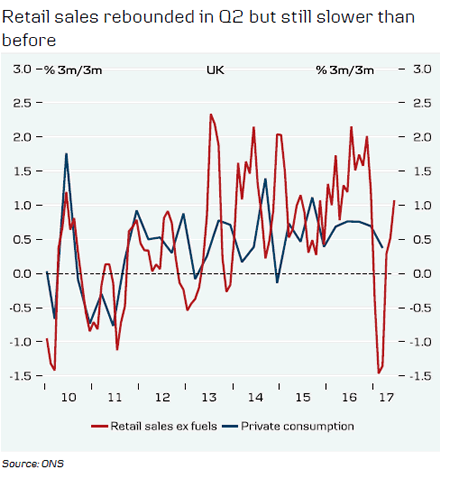
PMIs indicate GDP growth continued around current pace at the beginning of Q3
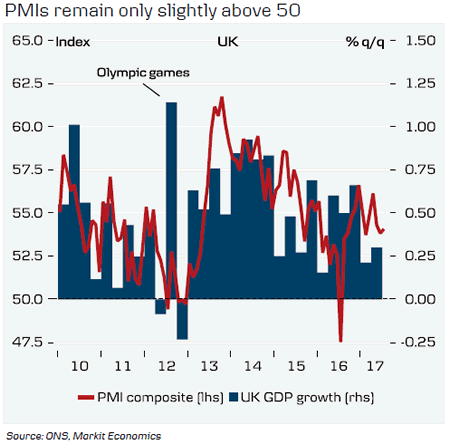
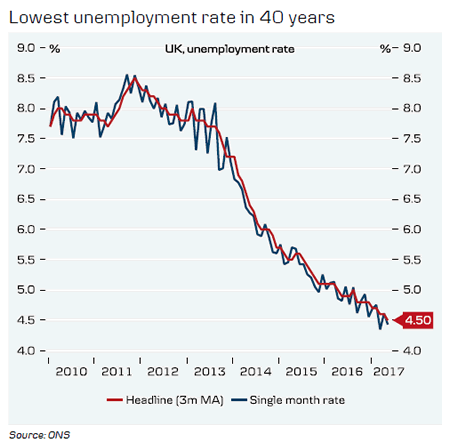
Weaker GBP => higher import prices => higher inflation => eroding purchasing power
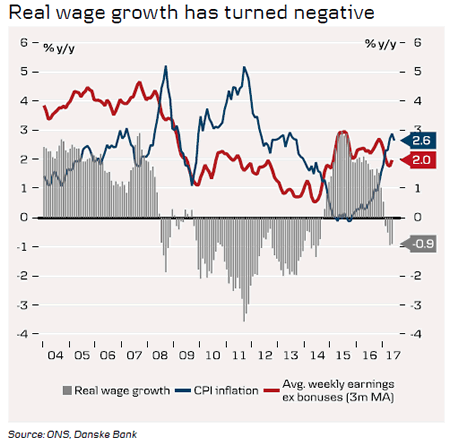
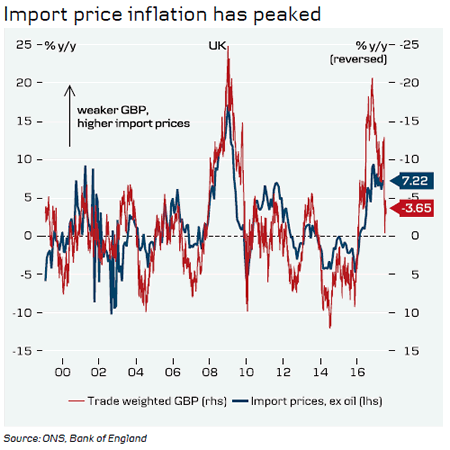
Higher commodity prices have contributed to higher inflation
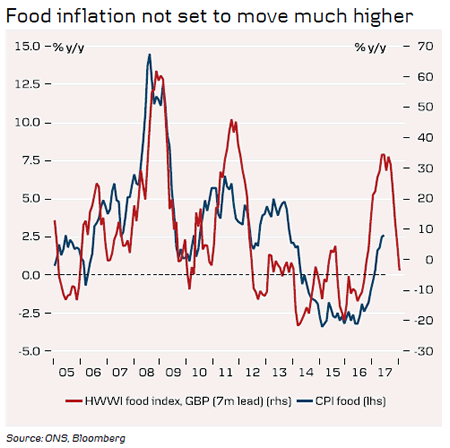
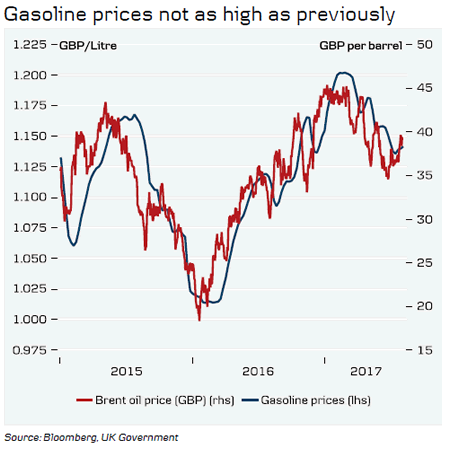
Inflation expectations have stabilised at a higher level
